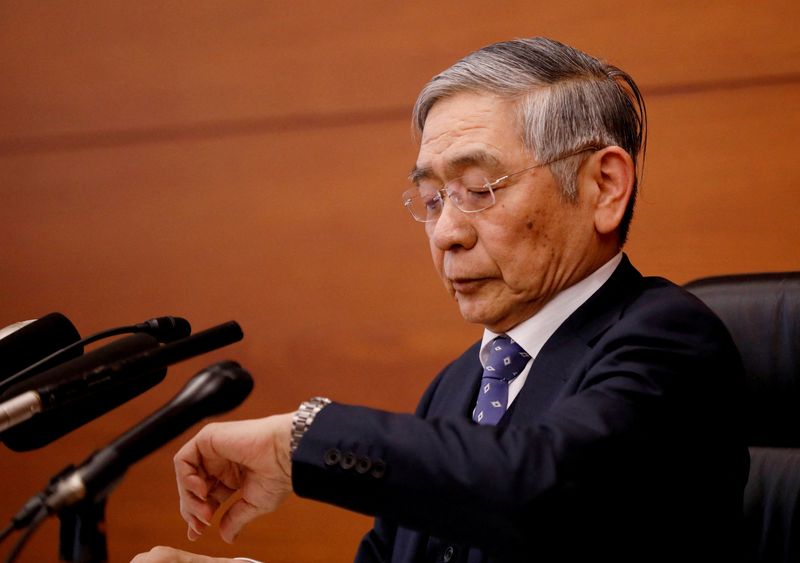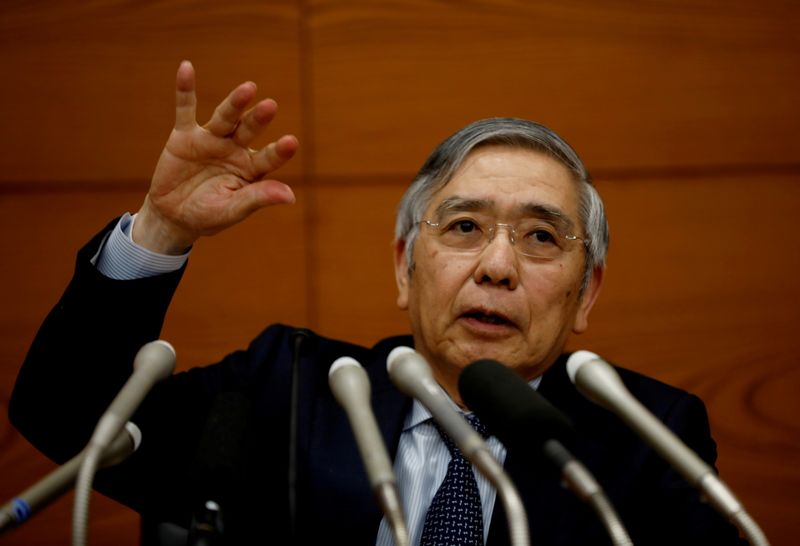By Leika Kihara and Tetsushi Kajimoto
TOKYO (Reuters) -Bank of Japan (BOJ) Governor Haruhiko Kuroda said on Tuesday the yen's recent moves were "somewhat rapid", joining a chorus of policymakers who have warned that sharp falls in the currency could hurt the country's import-reliant economy.
The remark was the strongest warning by Kuroda on yen moves since the currency's slide to a six-year low last week, and a sign the BOJ shares the government's concern over the potential damage to corporate sentiment from sharp yen falls.
"Recent (yen) moves have been somewhat rapid," Kuroda told parliament, adding that the BOJ was carefully watching currency moves due to their "huge" impact on the economy and prices.
"It's extremely important for currency rates to move stably reflecting economic and financial fundamentals," Kuroda said.
Kuroda, however, also repeated his view that a weak yen benefits Japan's economy as a whole, in contrast to some market views that its decline is doing more harm than good to the economy by pushing up import costs.
The dollar slid below 122.4 yen on Kuroda's comment, before rebounding to near 123 yen on Tuesday, still off the six-year high above 125 yen hit last week.
"Market players see Kuroda as a stern believer of the benefits of a weak yen," Makoto Noji, chief currency strategist at SMBC Nikko Securities.
"At best, today's comments may have been Kuroda's attempt to lean a bit closer to the government, which has warned of the side-effects of a weak yen."
Once welcomed as giving a boost to exports, a weak yen has become a headache for Japanese policymakers as it inflates the cost of fuel and raw material imports, which are already soaring due to the war in Ukraine.
Some analysts and lawmakers have blamed the BOJ's ultra-low interest rate policy for fuelling unwelcome yen declines.
Kuroda repeated the need for the BOJ to keep monetary policy ultra-loose, even as rising fuel costs are expected to push consumer inflation close to its 2% target.
Unlike other Western economies, Japan was not seeing sharp rises in wages in tandem with inflation, he added.
"We will patiently maintain powerful monetary easing to support an economy still in the midst of recovering from the COVID-19 pandemic's impact," Kuroda said.
During his stint as top currency diplomat, Kuroda guided several rounds of yen-selling intervention from 1999 through 2000 to combat sharp yen rises that caused an economic slump.
Asked about the experience, Kuroda said it was "hard to measure" the effect of currency intervention on markets.
The BOJ, however, was ready to use a powerful tool to avoid long-term interest rates from rising too much, he added.
The BOJ last week offered to buy unlimited sum of 10-year Japanese government bonds to defend an implicit 0.25% yield cap, a move that weakened the yen as investors focused on the widening interest rate gap between Japan and the United States.

Kuroda said the BOJ will continue to defend the cap as allowing bond yields to breach that level could hurt corporate capital expenditure and the broader economy.
"If long-term interest rates rise rapidly, we are ready to deploy such market operations," Kuroda said, signalling the bank's readiness to step into the market again as needed.
